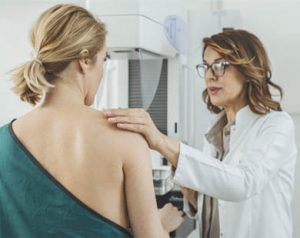 A cancer diagnosis of any type is frightening, but for women, breast cancer is especially scary. Increasingly, there is good news when it comes to breast cancer.
A cancer diagnosis of any type is frightening, but for women, breast cancer is especially scary. Increasingly, there is good news when it comes to breast cancer.
Breast cancer death rates have decreased steadily in the past 20 years, thanks to better screening and early detection, increased awareness, and continuous advancements in treatment options. In fact, there are over 3.8 million breast cancer survivors in the United States!
One in eight women will develop breast cancer in their lifetime. It is the most commonly diagnosed cancer among American women, except for skin cancers. Although rare, men get breast cancer, too — nearly 3,000 American men are estimated to receive a breast cancer diagnosis this year.
There are many subtypes of breast cancer, and each must be treated differently. Scientific advances in screening, genetic testing, immunotherapy, and other targeted treatments continue to transform the way breast cancer is diagnosed and treated. For example:
• Genetic testing can detect specific mutations unique to each patient. This enables doctors to personalize treatment that is most appropriate for that particular cancer.
• Immunotherapies boost or change the body’s own immune system to work harder and smarter to find, target, and attack cancer cells.
• New drugs, including some that block certain types of proteins, are showing great promise.
What exactly is breast cancer?
Breast cancer starts when normal, healthy cells in the tissues of the breast become changed or altered and begin to grow out of control. A build-up of these cells often forms a mass of tissue called a lump, growth or tumor. These cancer cells have the potential to get into the blood or lymphatic system and spread (referred to as metastasize) to other areas of the body. Breast cancer can occur in one or both breasts and can start from different areas of the breast.
What are the risk factors and who is most at risk?
While researchers don’t know exactly what causes breast cancer, being female and getting older are the greatest risks. The American Cancer Society estimates that 12% of American women will develop breast cancer by age 85.
The risk nearly doubles if a woman has a first-degree relative (mother, sister, daughter) who has been diagnosed with breast cancer. If you have a family history, you may want to discuss genetic testing with your doctor.
Our genes, lifestyle, and the environment around us may raise or lower our risk of getting many types of cancer. Many risks, such as obesity and alcohol use, can be moderated through healthy lifestyle choices.
Is screening for breast cancer important?
Absolutely yes!
Early detection can be a lifesaver.
Many women with breast cancer have no symptoms, which is why regular screening is so important. Simple screening tests can detect breast cancer early, even before symptoms appear.
In its earliest stages, where the cancer is localized and has not spread outside of the breast, the five-year relative survival rate is 99%, according to the American Cancer Society. Sixty-one percent (61%) of cases are diagnosed at this stage.
Identifying any type of cancer at an early stage, before it has spread extensively (metastasis), provides a much better outcome for patients. That is certainly the case when it comes to breast cancer. The earlier cancer is detected, the easier it is to treat — and patients likely will have a more positive prognosis.
What are the recommended breast cancer screenings for women?
Mammograms, low-dose x-rays of the breast, are the best test physicians have to detect changes in the breast and find breast cancer early. An abnormal mammogram does not always mean that cancer exists, but follow-up tests may be necessary to get more details.
The American Cancer Society recommends these general guidelines for women with no family history of cancer:
• Yearly for women ages 45 to 54 (or at age 40 if they wish)
• Every two years for women ages 55 and older*
* The American Cancer Society recommends that women continue mammography screening “as long as their overall health is good and they have a life expectancy of 10 years or longer.”
Mammograms are not routinely offered to men and may be difficult to perform if there is a small amount of breast tissue.
Rates of breast cancer vary among women and men of different ages and ethnicities. It’s important to become familiar with how your breasts normally look and feel, and report any changes to your health care provider right away. Routine physicals and an annual Ob-Gyn visit for women are recommended.
World-Class Cancer Treatment Close to Home
About Florida Cancer Specialists & Research Institute, LLC: (FLCancer.com)
Recognized by the American Society of Clinical Oncology (ASCO) with a national Clinical Trials Participation Award, Florida Cancer Specialists & Research Institute (FCS) offers patients access to more clinical trials than any private oncology practice in Florida. The majority of new cancer drugs recently approved for use in the U.S. were studied in clinical trials with Florida Cancer Specialists participation.* Trained in prestigious medical schools and research institutes, our physicians are consistently ranked nationally as Top Doctors by U.S. News & World Report.
Founded in 1984, Florida Cancer
Specialists has built a national reputation for excellence that is reflected in exceptional and compassionate patient care, driven by innovative clinical research, cutting-edge technologies, and advanced treatments, including targeted therapies, genomic-based treatment, and immunotherapy. Our highest values are embodied by our outstanding team of highly trained and dedicated physicians, clinicians, and staff.
North Port Cancer Center
1390 Grand Venture Drive
North Port, FL 34286
Port Charlotte
22395 Edgewater Drive
Port Charlotte, FL 33980
Venice Island
901 South Tamiami Trail
Venice, FL 34285
Venice HealthPark
836 Sunset Lake Blvd,
Suite 101
Venice, FL 34292
Englewood
714 Doctors Drive
Englewood, FL 34223
For more information, visit FLCancer.com









